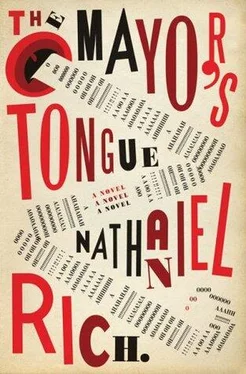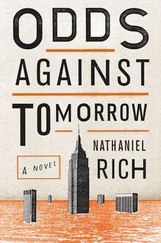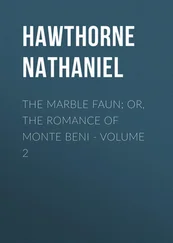But he needs to read the letter in isolation: he can't have Agnes craning over his shoulder to see what Rutherford has written. And he doesn't want her to find out what he has written to Rutherford either. Without saying a word, he takes the bedroom hamper and walks right back out of the apartment. Agnes doesn't even look up.
He takes the elevator to the apartment building's laundry room, where he stuffs the soiled bedsheets into a washing machine. Then he leans over the folding table and opens Rutherford's letter. He removes several pages of yellow handmade paper and, before reading them, holds the parcel up to his nostrils. Closing his eyes, he smells a sleepy aroma of Mediterranean sunshine, crushed garlic, and perhaps, very faintly, the bergamot tang of Rutherford's acqua di colonia.
"My friend," Mr. Schmitz says. He smiles. And then he opens his eyes.
After Rutherford's normal salutation, "Caro Sig. Schmitz," he has written:
"Thanks be to God! What beautiful day."
Mr. Schmitz crinkles his nose at this opening line. The letter proceeds rationally from there, so he attributes Rutherford's holy exuberance and his uncharacteristic ellipsis to the fuzzying effects of the Italian air. But there are other infelicitous phrasings. Rutherford writes from a piazza in the "city center." He sits by a fountain that he describes as "a pyramid topped by a red and brown ball." He goes on:
A thin sheet of water falls down the pyramid's four sides, at which point the stream is conducted through a narrow channel under a grate on the ground, where it then flows into a diamond-shaped reflecting pool. Couples sit around this pool on their lunch hour, nuzzling and tossing coins. Although Babila, a fourth-century saint of little distinction, has nothing to do with the tower of Babel, the Milanese refer to this statue — a popular meeting point due to its central location and proximity to a Metro stop — as "La Torre di Babele." An innocent but fitting solecism.
Except for the ancient Basilica di San Babila, the piazza is surrounded by expensive department stores and an enormous British record emporium, whose jumbo television screens flash American music videos. It was here, staring up at one of those screens, that I first saw him.
At this development, Mr. Schmitz begins to pet his chin.
Rutherford explains that "him" was a skinny oily-faced boy of about fourteen, with long brown hair, a hoop earring in one ear, and ankles no thicker than a three-iron. The boy paraded about without a shirt, his sun-yellowed chest bare and hairless. Granted, writes Rutherford, the Milanese summer is equatorial and filthy, but the shirtless boy made a peculiar sight amid all the suited "men of affairs," window-shopping tourists, and models clinging to their portfolios.
The absentminded boy ambled around the piazza, backing into racing pedestrians without seeming to notice. He leaned over the diamond-shaped pool and stared at his own reflection. Then he dipped his hands in the pool and splashed himself with the water. "What my countrymen call 'la benedizione dell'Acqua Santa,' " writes Rutherford. Afterward, the boy peered slowly around the piazza until his gaze fell on Rutherford, who was staring back at him, a single stationary figure in the febrile crowd.
Mr. Schmitz looks up from the letter, disturbed for a second time. Behind the glass portal of the washing machine the bedsheets churn in a bath of strawberry-colored bubbles.
Since then I've been feeling a strange sensation in the left side of my head. It's nothing painful, mind you — just the feeling that something is off . A floating. Like nausea of the brain. I don't know how else to describe it. I doubt it's connected to the appearance of the strange boy, though I have no other explanation.
I'm sure it will pass, but it has been two days now and I'm considering seeing a doctor. Yet I'm afraid my command of the language isn't up to the task. What do I complain of, "una nausea del cervello"? He'lllaugh me out of the hospital. A stupid American who can't tell his head from his stomach.
Rutherford goes on to explain that he has settled in a clean furnished apartment near the Porta Romana, which he calls a "beautiful quarter." The apartment is simple: a dining room, a study, and a bedroom, all of which "communicate." Rutherford was shocked to see the same shirtless boy one day later, this time in his own neighborhood. The kid was wearing exactly the same outfit — no shirt, black jeans, dirty red sneakers — and walked by the café where Rutherford took his morning coffee. As at San Babila, the urchin seemed ignorant of his surroundings, stalking behind a pair of fannypacked British women who were too absorbed in their guidebooks to notice him. If Rutherford could detect any single difference in the boy since the first sighting, it was that he was dirtier. His chest was smeared with a flaky rustlike substance, and his hair had wilted into a damp mop that hung down over his brow. Every so often he broke his languorous skulk for a beat and started skipping; after one such skip he disappeared behind the great Roman column. He never reappeared.
"I would have followed him, out of curiosity," writes Rutherford. "Only I was feeling quite fatigued on account of my head just then and had to retire to my bed." Here Rutherford ends his letter. As an afterthought, he adds a postscript saying that he is sorry to hear about Mrs. Schmitz's recent health problems. He hopes she is feeling better by the time Mr. Schmitz reads this.
After reading the letter through again, Mr. Schmitz carefully stuffs it back into the envelope. He takes the elevator upstairs, leaving the laundry to spin. When he enters the apartment, he sees that a plate of meatloaf and mashed potatoes has been left cooling for him at the kitchen table. He calls for his wife, but she has already gone to bed.
Eugene watched from the passenger seat, his fist white from squeezing the window handle, as Lang fidgeted with the clutch and kept peeking over the wheel so that he could see the road ahead. Lang was navigating his Cinquecento up a hill so steep that it seemed the car would peel back from the asphalt and backflip down the Carso. He explained in his loud, animated falsetto how guilty he felt for not agreeing sooner to help find poor Sonia, but Eugene wasn't mollified — he was worried they might be too late. Every time Lang fixed his beady gnat eyes on Eugene, Eugene would manically gesture ahead, causing Lang to snort and roll his eyes up into his head so that he couldn't see either passenger or road. He wore a teeny green plaid beret that made him look like a wood sprite.
It was at this juncture that Eugene noticed himself forming a new habit, one that might have alarmed him in the past but which he now accepted as a natural corollary to the unusual circumstances in which he found himself. He began talking to himself. With Lang around, he had sense enough to avoid speaking out loud, but he could imagine that a time would come when this would no longer be the case. How, he wondered, had he ended up at the foot of the Julian Alps, in a small city that had been forgotten not only by the world but also by its own country? He had read in a guidebook that most Italians didn't even realize Trieste was a part of Italy.
"Easily answered," said a meek voice just inside his left ear. "Duty. You were hired for this job. You have a duty to Abe, as well as to his daughter. Besides, it's better than picking up boxes, walking with them, and setting them down again."
"Easily answered," said a second voice, which seemed to be sitting in the base of his neck and spoke with some kind of ethnic accent — Yiddish perhaps. "You go along with whatever inane pursuits come your way, in the name of 'adventure'; you don't care about the girl — you barely know her — nor Abe, nor do you care if Eakins exists or doesn't. You're excited by peril, exploit, risk, rescue. For what cause, you don't care. This is your weakness. Basically, you got bored sitting at home with your babbo."
Читать дальше












